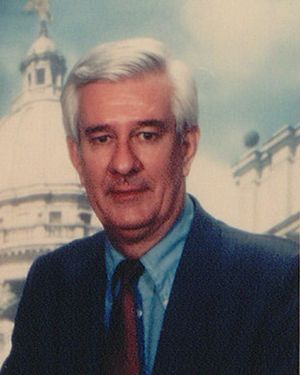Brad Dye facts for kids
Quick facts for kids
Brad Dye
|
|
|---|---|
 |
|
| 27th Lieutenant Governor of Mississippi | |
| In office January 16, 1980 – January 9, 1992 |
|
| Governor | William Winter William Allain Ray Mabus |
| Preceded by | Evelyn Gandy |
| Succeeded by | Eddie Briggs |
| 47th State Treasurer of Mississippi | |
| In office January 18, 1972 – January 20, 1976 |
|
| Governor | Bill Waller |
| Preceded by | Evelyn Gandy |
| Succeeded by | Ed Pittman |
| Member of the Mississippi State Senate from the 31st district |
|
| In office 1964–1968 |
|
| Member of the Mississippi House of Representatives | |
| In office 1960–1964 |
|
| Personal details | |
| Born | December 20, 1933 Charleston, Mississippi, U.S. |
| Died | July 1, 2018 (aged 84) Ridgeland, Mississippi, U.S. |
| Resting place | Charleston Cemetery Charleston, Mississippi |
| Political party | Democratic |
| Spouse | Donna Bailey (m. 1963-2018, his death) |
| Children | 3 sons |
| Alma mater | University of Mississippi (BA, JD) |
| Profession | Lawyer |
Bradford Johnson Dye Jr. (born December 20, 1933 – died July 1, 2018) was an American politician and lawyer. He is best known for serving as the Lieutenant Governor of Mississippi. He held this important role from 1980 to 1992. Brad Dye was the only person in Mississippi's history to be Lieutenant Governor for 12 years in a row.
Contents
Early Life and Education
Bradford Johnson Dye Jr. was born in Charleston, Mississippi, on December 20, 1933. His parents were Bradford Johnson Dye and Maylise Dorgan Dye. His father was also a politician, serving in the state legislature.
Brad Dye went to the University of Mississippi. He earned a degree in Business Administration in 1957. Then, in 1959, he earned a law degree from the University of Mississippi School of Law. He married Donna Bess Bailey, and they had three sons together.
Political Career
Brad Dye was a member of the Democratic Party. He started his political journey early. In the 1950s, he worked as a page in the United States House of Representatives. A page helps members of Congress with tasks. He also helped with political campaigns.
Serving in the Legislature
In 1959, Brad Dye was elected to the Mississippi House of Representatives. He served there from 1960 to 1964. After that, he became a member of the Mississippi State Senate. He served in the Senate from 1964 to 1968.
From 1961 to 1964, he worked as a lawyer for the United States Senate Committee on the Judiciary. Later, he became a commissioner for the Workman's Compensation Commission. He also led the Mississippi Agricultural and Industrial Board from 1968 to 1971.
State Treasurer
Brad Dye served as the Mississippi State Treasurer from 1972 to 1976. The State Treasurer manages the state's money. In 1975, he tried to become Lieutenant Governor but did not win that election.
Lieutenant Governor of Mississippi
Brad Dye was elected Lieutenant Governor in 1979. He took office on January 16, 1980. As Lieutenant Governor, he had a lot of power in the Mississippi State Senate. He could choose which senators served on different committees. This helped him guide new laws. He also became the chairman of the Senate's Rules Committee.
Education Reform
In 1982, Governor William F. Winter called a special meeting of the legislature. They met to discuss a big plan to improve education. Brad Dye helped make sure this important education bill passed. This bill included creating public kindergartens. He worked with other senators to get their support. The bill became law, which was a big step for Mississippi's schools.
Re-election Campaigns
Brad Dye won his second term as Lieutenant Governor in 1983. He defeated Gil Carmichael in that election. In 1987, he won again, serving a third term. This made him the longest-serving Lieutenant Governor in Mississippi's history. He served for 12 years in a row.
In 1991, he ran for re-election again. He faced challenges from other candidates. He lost the general election to Eddie Briggs. Brad Dye encouraged the House of Representatives to accept Briggs' victory. Briggs took over the office on January 9, 1992.
Unlike many others, Brad Dye did not use the Lieutenant Governor's office as a stepping stone to become governor. Later, rules were changed to limit the Lieutenant Governor to two terms.
Later Life and Death
In 2007, Brad Dye supported Haley Barbour for governor. Governor Barbour later honored Dye in 2010. He presented him with the Mississippi Medal of Service.
Brad Dye passed away on July 1, 2018. He died from respiratory failure in Ridgeland, Mississippi. He was buried in Charleston Cemetery in Charleston, Mississippi.
 | James Van Der Zee |
 | Alma Thomas |
 | Ellis Wilson |
 | Margaret Taylor-Burroughs |

